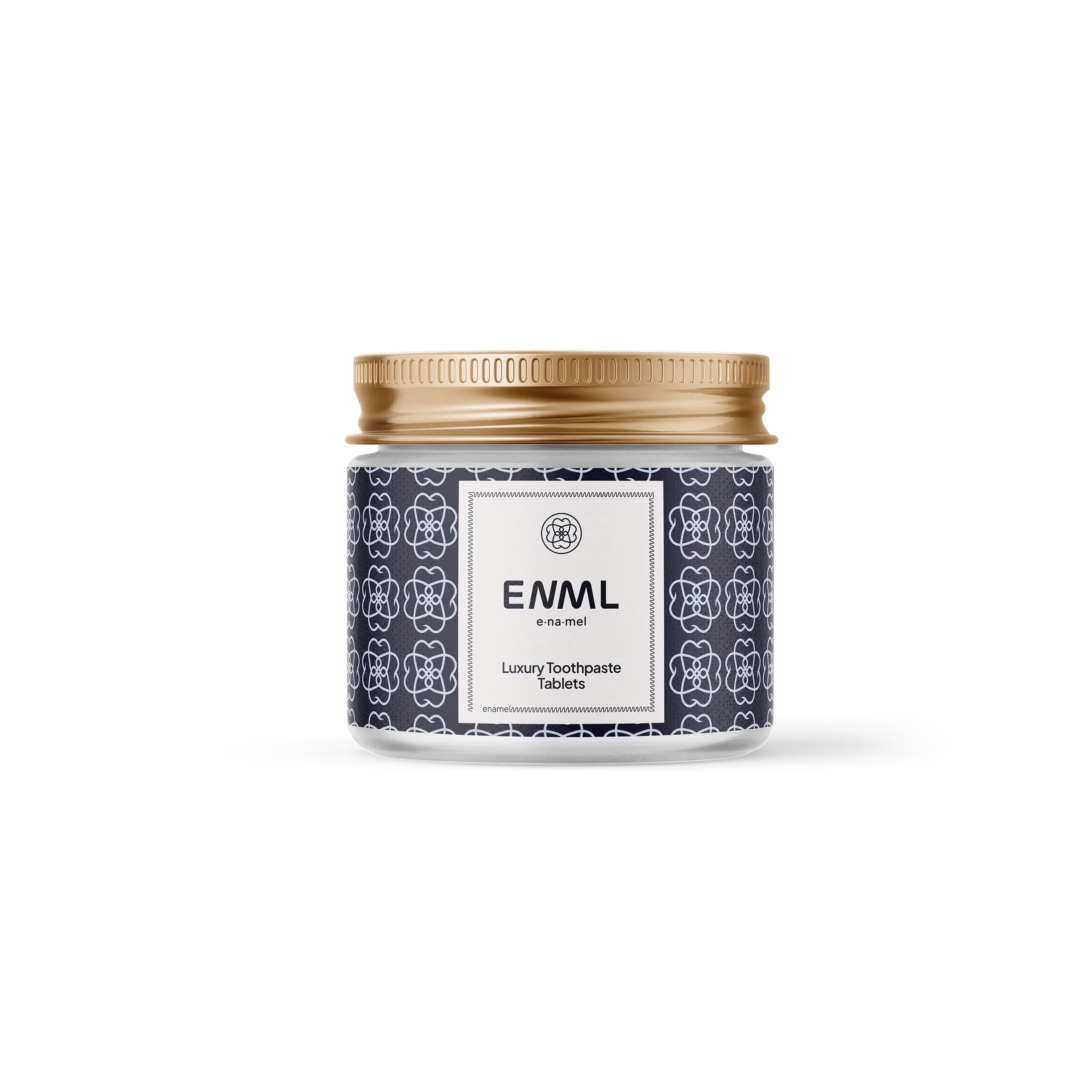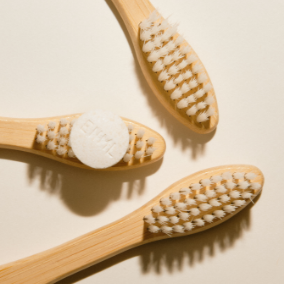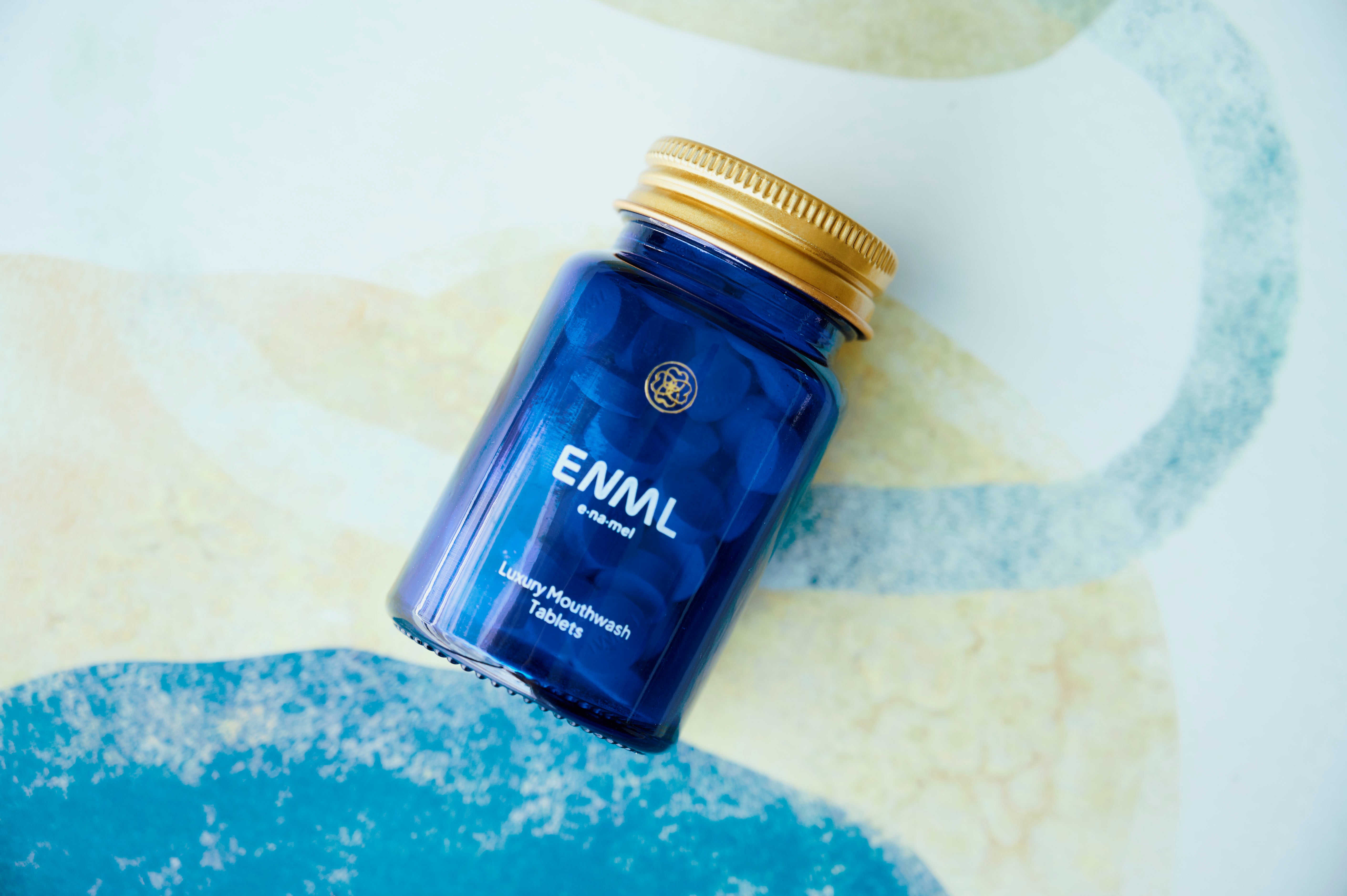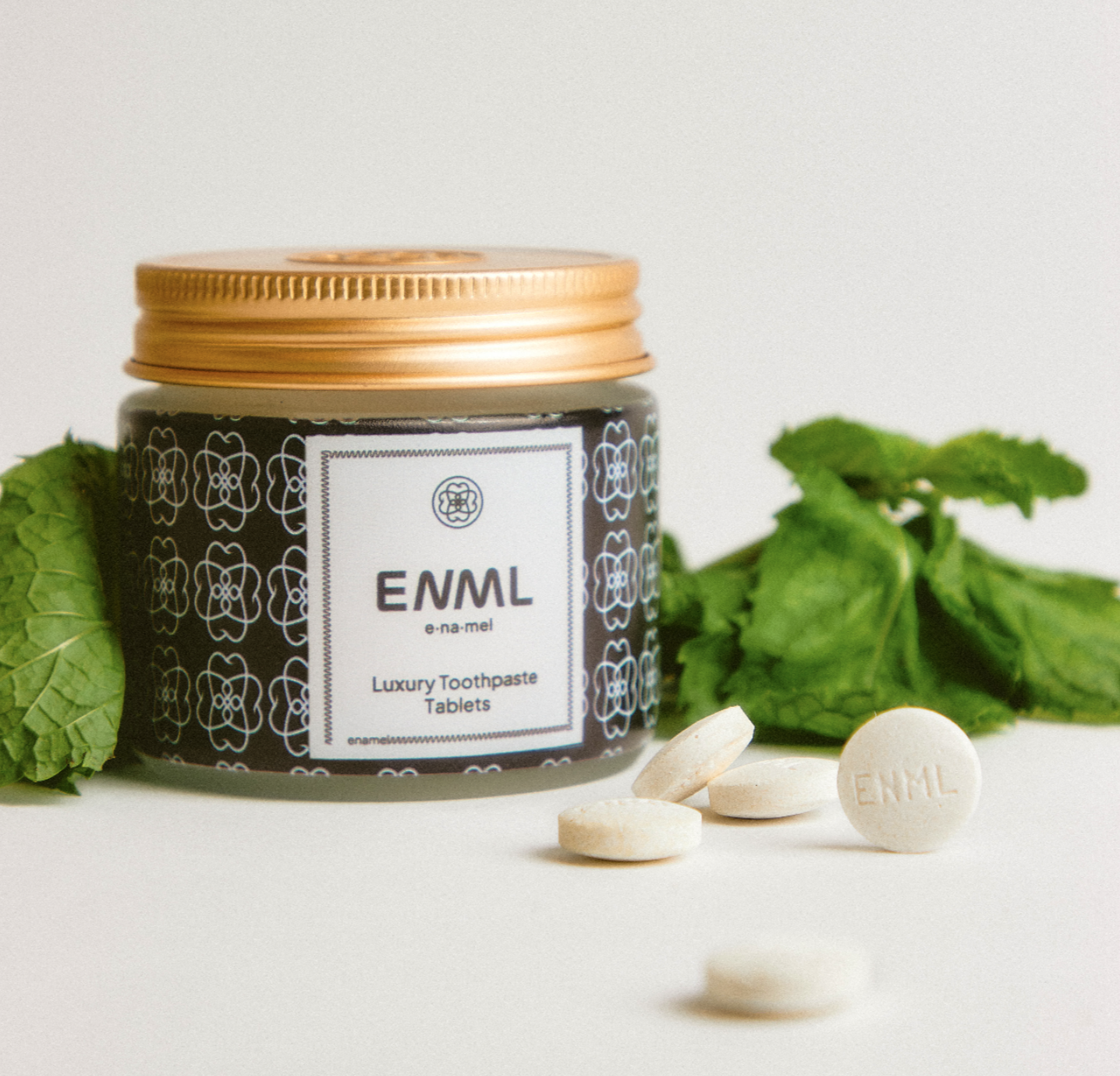Have questions about toothpaste tablets? We have answers. Whether you’re traveling or at home, toothpaste tablets are a more environmentally friendly and convenient way to brush your teeth, but they’re fairly new, so people often don’t know a lot about them. If you’re curious about toothpaste tablets, check out our comprehensive FAQ about them.
Jump to a Question
- What Exactly Are Toothpaste Tablets?
- How Do Toothpaste Tablets Work Compared to Conventional Toothpaste?
- What Are the Key Benefits of Switching to Toothpaste Tablets?
- How Should I Store Toothpaste Tablets to Ensure They Remain Effective?
- What Is the Typical Shelf Life of Toothpaste Tablets? Can Toothpaste Tablets Expire?
- How Do I Properly Use a Toothpaste Tablet?
- How Many Toothpaste Tablets Should I Use Per Brushing?
- Can Toothpaste Tablets Be Used With Both Manual and Electric Toothbrushes?
- Should I Rinse My Mouth After Using a Toothpaste Tablet?
- Can I Use Toothpaste Tablets to Clean My Tongue or as Part of a Full Mouth Care Routine?
- Are Toothpaste Tablets Safe for Sensitive Teeth and Gums?
- Do Toothpaste Tablets Contain Fluoride?
- Are Fluoride-Free Toothpaste Tablets Effective?
- Are Toothpaste Tablets ADA-Approved or Backed by Dental Professionals?
- Can Toothpaste Tablets Help With Whitening Teeth?
- Why Are Toothpaste Tablets Considered More Eco-Friendly Than Traditional Toothpaste Tubes?
- Are Toothpaste Tablets TSA Compliant? Can I Easily Bring Toothpaste Tablets on a Plane?
General Toothpaste Tablet FAQs
What Exactly Are Toothpaste Tablets?
A toothpaste tablet is just like traditional toothpaste but without the water included in the paste. The lack of water allows the teeth-cleaning paste to be pressed into a pea-sized, pill-like shape. While most toothpaste tablets are made with the same or similar ingredients, many don’t include fluoride. Instead, they’ll use hydroxyapatite, which is just as effective as fluoride at preventing demineralization and remineralizing teeth.

How Do Toothpaste Tablets Work Compared to Conventional Toothpaste?
Toothpaste tablets work just like conventional toothpaste. Once you put the tablet in your mouth and chew on it, it will dissolve into a paste that you can use to brush your teeth.
What Are the Key Benefits of Switching to Toothpaste Tablets?
Wondering about the benefits of toothpaste tablets? Check out a quick overview of a toothpaste tablet’s main advantages:
- Easy to travel with, as you won’t have to worry about restrictive toothpaste requirements while flying
- Precise, correct dose of toothpaste with every tablet
- Reduced plastic waste, as most toothpaste tablets are sold in environmentally friendly packaging, like glass jars, rather than plastic tubes
- Easier and cleaner to use since you don’t have to squeeze toothpaste onto your toothbrush
- Many fluoride-free options with effective alternative ingredients
- Use of natural ingredients with cruelty-free, vegan, and gluten-free options
How Should I Store Toothpaste Tablets to Ensure They Remain Effective?
Storing toothpaste tablets is fairly easy, as they usually come in a glass jar that you can easily seal. The tablets should be kept in a sealed, airtight jar and a dry area without lots of moisture or heat to prevent them from melting. Avoid placing them in direct sunlight or in an area above standard room temperature.
What Is the Typical Shelf Life of Toothpaste Tablets? Can Toothpaste Tablets Expire?
While it varies by the particular tablet, most toothpaste tablets have a shelf life of one to three years. Since toothpaste tablets can expire, make sure to check the expiration date after purchasing them.
Usage & Application Toothpaste Tablet FAQs
How Do I Properly Use a Toothpaste Tablet?
Toothpaste tablets aren’t complicated to use, with the only difference being that you need to chew a tablet first. Below, you can find step-by-step instructions for using toothpaste tablets correctly:
- Start by placing a single tablet in your mouth.
- Chew the tablet gently and let it mix with your saliva to turn it into a paste.
- Wet your toothbrush and brush your teeth like you normally would for two minutes.

How Many Toothpaste Tablets Should I Use Per Brushing?
An added benefit of toothpaste tablets is that they’re sized so you can use one of them each time you brush your teeth. Unless you want to use more paste, a single tablet will completely clean your teeth.
Can Toothpaste Tablets Be Used With Both Manual and Electric Toothbrushes?
Toothpaste tablets can be used with either manual or electric toothbrushes! All that changes is that the paste will already be in your mouth when you start to brush, meaning toothpaste tablets are safe for any type of toothbrush.
Should I Rinse My Mouth After Using a Toothpaste Tablet?
Like toothpaste, you don’t need to rinse your mouth out after you finish brushing your teeth. While a very abrasive toothpaste could wear down enamel if left on your teeth for a long time, most toothpaste and toothpaste tablets are entirely safe to leave on your teeth instead of rinsing them off. If you’re worried about fluoride ingestion, fluoride-free tablets are safe to leave on your teeth without worrying about ingesting any potentially harmful substances.
Leaving toothpaste tablet residue on your teeth can actually help your teeth even more, as it will give the paste additional time to work and protect your teeth. For example, leaving toothpaste residue on your teeth overnight can help prevent tooth sensitivity and decay, especially if the product is made with hydroxyapatite.
Can I Use Toothpaste Tablets to Clean My Tongue or as Part of a Full Mouth Care Routine?
It’s completely safe to use toothpaste tablets to clean your tongue as part of your mouth care routine. However, we’d recommend using a tongue scraper after you’re done brushing your teeth, as some research supports them being more effective than a toothbrush. After you’re done using a tongue scraper, rinse your mouth out with mouthwash ( mouthwash tablets also exist!) to give your tongue a deeper clean.
Health, Safety & Efficacy Toothpaste Tablet FAQs
Are Toothpaste Tablets Safe for Sensitive Teeth and Gums?
Like regular toothpaste, some toothpaste tablets are safe for sensitive teeth and gums, while others aren’t. Most companies will advertise if their toothpaste tablets are formulated for sensitive teeth and gums, but you may want to consult with your dentist to make sure a particular toothpaste tablet is safe.
Generally, toothpaste tablets that are safe for sensitive gums and teeth will have micro-hydro or nano-hydroxyapatite in them since they can reduce teeth sensitivity.
Do Toothpaste Tablets Contain Fluoride?
Some toothpaste tablets contain fluoride, while many others don’t. Any reputable company will have a clear label that states whether it uses fluoride or not.
Are Fluoride-Free Toothpaste Tablets Effective?
Fluoride-free tablets can be just as effective as fluoride toothpaste or toothpaste tablets. However, some toothpaste tablets that don’t contain fluoride won’t include active ingredients that provide a similar level of protection from cavities, plaque, and tooth decay. As a result, you’ll want your fluoride-free toothpaste tablets to include hydroxyapatite, which reduces sensitivity, repairs enamel, and prevents cavities.
Are Toothpaste Tablets ADA-Approved or Backed by Dental Professionals?
Since toothpaste tablets are fairly new, the American Dental Association hasn’t approved any toothpaste tablets on the market today. However, toothpaste tablets are backed by many dental professionals. The most ethical and effective toothpaste tablets will be made with a dentist’s assistance to ensure they’ll provide the same level of cleaning and protection.
Can Toothpaste Tablets Help With Whitening Teeth?
Many toothpaste tablets are made with ingredients that help whiten teeth. For example, some will feature a stable, non-aqueous oxidizing agent in their ingredients to whiten teeth.
Environmental & Travel Benefits
Why Are Toothpaste Tablets Considered More Eco-Friendly Than Traditional Toothpaste Tubes?
Toothpaste tablets tend to be more eco-friendly than traditional toothpaste tubes due to their packaging. While most toothpaste comes in plastic and aluminum tubes that are difficult to recycle, toothpaste tablets usually come in glass or other easily recyclable packaging. With over a billion toothpaste tubes thrown away each year in the U.S. alone, moving to sustainable toothpaste tablets can significantly reduce your (and the country’s!) environmental footprint.
Are Toothpaste Tablets TSA Compliant? Can I Easily Bring Toothpaste Tablets on a Plane?
Toothpaste tablets are fully TSA-compliant, meaning you can take them in a carry-on bag through security without worrying about them being thrown away. Since they’re kept in a dry, moisture-free form, they’re not subject to the TSA’s liquid restrictions that apply to standard toothpaste.
Elevate Your Oral Care Routine With ENML’s Toothpaste Tablets
At ENML, we’re proud to offer fluoride-free luxury toothpaste tablets to people who want a more convenient and environmentally friendly way to clean their teeth. Since we don’t rely on fluoride, we include micro-micro-hydroxyapatite in our tablets to ensure they protect your teeth from cavities and decay. We’re also committed to creating zero-waste toothpaste, meaning our tablets come in sustainable packaging and feature natural, non-toxic ingredients.
Check out our toothpaste tablets and mouthwash tablets today. If you have any questions, please contact us.






